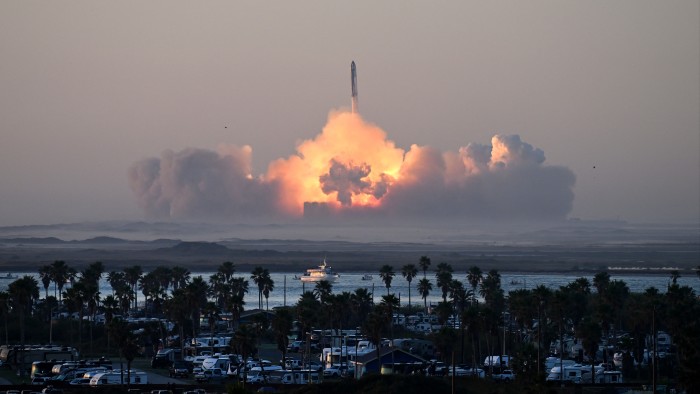It has come full circle. The nation that put a man on the Moon and gave us Star Trek has a cure for the biggest problem facing our species: settle another planet. Here I should pause to complain about Donald Trump and his reckless disregard of climate change. But Swampians know what I think and most of you probably agree. Let’s just take that as read.
What you might feel less comfortable in admitting is that Trump is giving utterance to America’s soul. The US is driven by the spirit of limitless resources and surmountable frontiers. Its mission is “To explore strange new worlds . . . to boldly go where no man has gone before”, as James T Kirk put it. On Tuesday Trump promoted Elon Musk, his own Captain Kirk, to Starfleet Admiral. Musk’s USS Enterprise is the department of government efficiency (Doge). He will share command of that bridge with Vivek Ramaswamy. Some of you might think that an outfit devoted to efficiency that starts with two heads is cursed to fail. In practice, Musk will surely be primus inter pares and Ramaswamy will be his Spock.
The crucial point is that Musk believes that Doge will give him the power to clear the Washington regulatory hurdles blocking his path to Mars. His main bugbear is the Federal Aviation Administration, which has allegedly been slow-walking approval for testing of the unmanned Starship that Musk plans to launch to Mars in 2026. His goal is to send humans there by 2030, thus commencing his dream of making us “an interplanetary species”. The eventual plan is for a city of a million people on Mars to provide a bridgehead for humanity’s escape from its earthly mess.
Lest you think all this is pie-in-the-sky, Trump is on board. When Musk joined him on stage for his rally in Butler, Pennsylvania last month, he was wearing a T-shirt that said: “Occupy Mars!” You and I might joke about Musk’s infinite self-belief, but the world’s most powerful man is taking it seriously. “A star is born,” said Trump of Musk after his election victory.
What does this mean for climate action? Trump plans a repeat of what he did in his first term when he pulled out from the Paris agreement and ceased most global climate co-operation. He also plans to “drill, baby, drill” in the Arctic Circle, off America’s coastal seaboards and for onshore fracking. It is unclear whether Doge will have any statutory authority, which would require an act of Congress, or simply be a super-advisory body to the Trump administration. Either way, Musk’s goal is to close down regulatory agencies in Washington or drastically pare them back. He recently said he would also cut almost a third from the federal government’s $6.7tn budget. I will book a seat to Mars if Musk gets anywhere close to persuading Congress to hand over its power of the purse to him. Trump, too, might get impatient with advice that would quickly turn him into a pariah among Maga voters who depend on social security, the Veterans Benefits Administration, and other government support to keep their heads above water.
But Musk will probably get a lot of his way on deregulation. If you work for the Securities and Exchange Commission, the Department of Justice, the US Federal Reserve, the Bureau of Labor, the Environmental Protection Agency, the US Department of Agriculture or the departments of energy and education, be afraid; be very afraid. A Musk-branded Schedule F has you in its sights. If you want to see American leadership on climate change in the next four years you should abandon all hope. America believes it has made more than enough sacrifice on fossil fuels. The fact that the average American emits 14 tonnes of carbon a year, compared with about half that in Europe and China, and less than a seventh in India is irrelevant. America plans to boldly go where it has been many times before.
Pilita, I see you have ventured with some boldness to Azerbaijan to cover the COP29 summit. I can think of no better person than you to make sense of what I have just written. It is particularly striking that Sir Keir Starmer, Britain’s prime minister, also travelled to Baku to make an extravagant carbon pledge on behalf of the UK (which emits five tonnes per capita, barely a third of America’s). Should we count America out of the game or will technology come to our rescue?
Recommended reading
-
My column this week looks at Trump’s mandate for retribution in which I warn that he would use his next attorney-general as a personal lawyer to pursue his enemies. I did not imagine that a day later he would pick Matt Gaetz — perhaps the most floridly outrageous of all Trumpians, and a man who was under investigation by his own colleagues in the House ethics committee. As Aristotle might by this point have said, “WTAF?”
-
Do also read my colleagues’ stunning report on how Kamala Harris’s campaign turned down an interview with Joe Rogan, the podcast God of young American males. There was no more important demographic for Harris to win over — and no better vehicle for reaching them. But progressives inside the Harris campaign successfully objected, warning there would be a backlash. America’s cultural left is Trump’s best friend.
-
Though he doesn’t know it, Trump’s worst enemies are those urging him to declare a global trade war. As my colleague Martin Wolf lays out in his impeccable economic logic, the goal of restoring the manufacturing jobs we have lost is a chimera. They are not coming back. “Manufacturing fetishism is destined to fail.”
Pilita Clark responds
Greetings from Baku, Ed, where the US election result has left this year’s two-week climate COP going where none of these meetings has ever quite gone before.
Trump’s victory is — as US climate envoy, John Podesta, said on the first day of the summit — “bitterly disappointing” for anyone dedicated to climate action.
But the world, and especially the US, is in a very different place compared to 2017, when Trump formally said he would pull America out of the Paris agreement.
Back then, there was no hint of the sweeping Inflation Reduction Act climate law and other green industrial policies ushered in by the Biden administration.
In the almost Muskian words of White House climate adviser, Ali Zaidi, these measures amount to “booster packs on a rocket” of a private sector now primed to reach for new green investment stars. We will look back at this period as the moment when the US achieved “escape velocity” in critical areas of the decarbonisation mission, Zaidi said in Baku.
I hope he is right. But the truth is, we don’t yet know what Trump 2.0 will mean for US climate action.
On Wednesday there was an unnerving sign of what might happen elsewhere when it emerged that Argentina’s COP negotiators had been unexpectedly ordered home. Their Trump-supporting president, Javier Milei, had spoken to the US president-elect the day before.
So far there is no hint of a wider rush for the exit at COP. No country followed the US out of the Paris agreement during the first Trump administration either.
But these are still unsettling times and, like much of the rest of the world, climate action advocates are strapped in and buckled up for whatever strange new worlds lie ahead.
Your feedback
And now a word from our Swampians . . .
In response to “Why Kamala Harris lost”:
“What [Democrats] did not realise, or simply discounted, was that Harris was not a good candidate. She was neither a popular candidate for the nomination in 2020 nor was she a popular vice-president. She is not a particularly good public speaker, and couldn’t clearly elucidate her positions. She offered few negatives, but just as few positives. She was safe, but not compelling. Trump presented a candidate for the public to vote against, but Harris was not someone people wanted to vote *for*.” — Roger Yerger
“There are many pockets of discontent in American society (students, blue-collar workers, minorities, women) each for a specific reason. The final outcome is malaise, which for younger generations was also exacerbated by Covid. Such malaise is something America can’t cope with, being an ingenuous and optimistic country. Democrats avoided taking a deep look at the malaise, tried to rally on the anger of women for overturning Roe vs Wade. It did not work.” — Martino Mazzonis
Your feedback
We’d love to hear from you. You can email the team on swampnotes@ft.com, contact Ed on edward.luce@ft.com, and follow him on X at @EdwardGLuce. We may feature an excerpt of your response in the next newsletter
Source link









